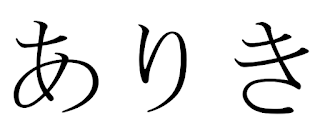Ariki

???
ariki is a word you sometimes see or hear in Japanese that is usually used after the word ketsuron, which means "conclusion."
ari is from the word aru (to have, to be - depending on the context) and the now antiquated ki, which was an auxiliary verb used to express reminiscing. Reminiscing is always about the past, so ariki was, in effect, the past tense of aru, or, what is now atta.
Setting aside the ketsuron ariki phrase for a moment (which we'll get to in a bit), the most famous use of ariki is in the Japanese translation of the Bible, specifically the opening verse of the Gospel of John which, in English, goes, "In the beginning was the Word." In Japanese this is hajime ni kotoba ariki ?????????.
The autobiography of the prolific Japanese author, Ayako Miura (1922-99) was called Michi Ariki (renamed "The Wind is Howling" in the English language version), meaning "in the beginning was the road" - no doubt reflecting her conversion to Christianity later in life.
So from its original meaning back in ancient times of simply referring to something in the past, ariki now has the meaning of "in the beginning." Apply that to "conclusion" (ketsuron ariki) and you have the meaning of the conclusion, the outcome, having come first. We have a phrase for this in English, a foregone conclusion, which, as with ketsuron ariki, usually has negative connotations.
ketsuron ariki is very much part of the politicia...
Fuente de la noticia:
japan visitor
URL de la Fuente:
http://japanvisitor.blogspot.com/
| -------------------------------- |
| Eating a $200 Square Watermelon ? ONLY in JAPAN |
|
|





